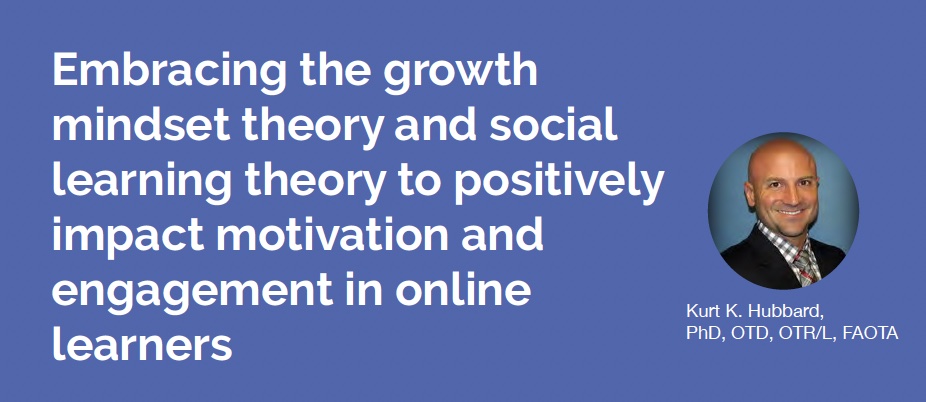Embracing the growth mindset theory and social learning theory to positively impact motivation and engagement in online learners

Online education refers to a learning process in which at least 80% of the course content is delivered via an online learning platform (Yeboah, Dogbey, & Smith, 2016). Hybrid education is a curriculum that has at least 50% of their delivery online. Increasingly, OT entry level programs are being delivered using hybrid curriculum. In addition, post-professional OT programs are primarily online in education delivery. According to the literature, enrollments in online education have grown rapidly in the past decade throughout postsecondary education (Jaggars, 2014). This growth offers learners opportunities, but also presents challenges for learners enrolled in online courses. For instance, despite the rapid growth in enrollment for online distance education courses, learner persistence and academic performance in online courses is often much lower than in traditional non-online courses (Croxton, 2014). Furthermore, according to Kauffman (2015), attrition rates remain high for online education courses as compared to traditional non-online distance education courses. Online education research studies have identified internal factors that lead to the underperformance for online learners (Croxton, 2014). These internal factors include lack of motivation, challenges with self-determination, and issues with not experiencing online engagement (Croxton, 2014). To this end, online college students who experience the least amount of motivation and engagement are said to be at a greater risk of dropping out (Pruett & Absher, 2015). It is of interest to identify ways the faculty can have an essential role in improving the motivation and engagement of online learners moving forward.
According to Hays and Handler (2020), a well-designed online course that implements proven effective teaching and engagement strategies will improve the motivation and engagement of online learners. It is reasonable to assume faculty understand their place in using effective online teaching strategies designed to motivate and engage online learners to leverage academic success. If this is not done, there is a potential for learners to be dropping out of classes, which is a significant contributor to attrition rates in higher education. To reiterate, the attrition rates for classes taught online are usually higher compared to classes taught in a traditional non-online setting (Angelino et al., 2007). Researchers agree the most successful students in online learning environments are self-disciplined, self- motivated, engaged, goal-oriented, responsible, and organized (Gregory & Lampley, 2016).
Growth mindset theory: Using a theory facilitates the explanation of a phenomenon like learner engagement in online environments. The growth mindset theory is a performance base theory. This theory embraces the idea that individuals possess intelligence that is malleable and that individuals can increase their intelligence through hard work; the theory views effort as a necessary part of the learning process (O’Rourke et al., 2014). This assumption lends itself to the idea that if a learner is willing to take on new learning strategies, learners will display persistence behaviors, an increase in motivation, a grit attitude, and an increase in effort (Vandewalle, 2012). The effort of the online learner is an important aspect to consider. An easy way to impact this by an online instructor is to recognize the effort of the online learner. According to Seaton (2018) in the online college environment, learners often give up quickly and start falling behind in coursework. Praising learners for their progress and their effort leads to a culture of creating a growth mindset (Dweck, 2010). Praising in online learning can refer to acknowledging the work and effort during challenging activities with words of affirmation (O’Rourke et al., 2014). Online instructors can create meaningful learning activities and present them in a way that fosters student resilience, which can lead to long-term achievement (Dweck, 2010). An example of this is an instructor tailoring instruction to the individual needs by using experiential approaches to learning and placing an emphasis on individual choice and autonomy (Morrison & Allen, 2007). The transfer to long-term achievement strategies should be used to facilitate online learners to apply, analyze, synthesize, and evaluate to promote higher-level learning (Ally, 2004).
Self-determination theory: Another useful theory to give this issue context, is using the basic principle of self-determination theory (SDT), which assumes it is characteristic of human nature to be curious and interested in learning, develop one’s knowledge, and need psychological growth (Niemiec & Ryan, 2009). With regards to online learning, the application of the self-determination theory framework is useful to gain a better understanding of learners’ natural tendencies to learn and develop (Niemiec & Ryan, 2009). Self- determination theory is a framework that organizes human motivation on a continuum ranging from intrinsic motivation to extrinsic motivation (Butz et al., 2014). Intrinsically motivated individuals perform a behavior for the inherent satisfaction it provides; that is, they find the activity interesting or enjoyable (Butz et al., 2014). Self-determination theory addresses autonomy, relatedness, and competency as determinants of motivation and these three constructs correspond to features of online learning such as, flexible learning (Chen & Jang, 2010). Self-determination theory could serve as a theoretical framework that integrates issues found within online learning (Chen & Jang, 2010). For example, SDT addresses autonomy, relatedness, and competency as determinants of motivation. The three constructs correspond to features of online learning such as flexible learning, computer-mediated communication, social interaction, and challenges for learning technical skills (Chen & Jang, 2010). According to Lee et al. (2015), successful completion of online learning depends on students maintaining active engagement in the course activities and requires self- regulatory skills and an increase in autonomy. Research has shown that online students perceive autonomy in their learning when the online instructor supports their interests, preferences, values, and psychological needs (Lee et al., 2015). Online learners can have complex blends of motivational levels, therefore supporting student autonomy is important to consider with regards to facilitating successful course completion (Lee et al., 2015). Instruction that faculty can impart in their classroom should impact the following areas within the learner: persistence, effort, autonomy, competency, relatedness, intrinsic motivation, and extrinsic motivation.
In conclusion, online learning research has demonstrated low retention rates have raised concerns about the quality of online learning (Lee & Martin, 2017). One of the most common design challenges in online learning environments is how to develop and utilize effective online teaching strategies designed to motivate and engage the online learner (Ozogul, 2018). Motivation and engagement have been identified as a critical factor in learning (Chen & Jang, 2010). However, many view motivation and engagement levels to participate in online degree programs as outside of faculty control (Yoo & Huang, 2013). Using strategies that facilitate learner performance with the lens of the growth mindset theory and the social learner theory are ways to influence the motivation and engagement of online learners.
References
Ally, M. (2004). Foundations of educational theory for online learning. In T. Anderson. & F. Elloumi (Eds.), Theory and Practice of Online Learning. Athabasca University.
Angelino, L. M., Williams, F. K., & Natvig, D. (2007). Strategies to engage online students and reduce attrition rates. Journal of Educators Online, 4(2), 1-14.
Butz, N. T., Stupnisky, R. H., Peterson, E. S., & Majerus, M. M. (2014). Motivation in synchronous hybrid graduate business programs: A self-determination approach to contrasting online and on-campus students. Journal of Online Learning & Teaching, 10(2), 211-227.
Chen, K. C., & Jang, S. J. (2010). Motivation in online learning: Testing a model of self-determination theory. Computers in Human Behavior, 26(4), 741-752. doi:10.1016/j.chb.2010.01.011
Croxton, R. A. (2014). The role of interactivity in student satisfaction and persistence in online learning. Journal of Online Learning and Teaching, 10(2), 314.
Dweck, C. S. (2015). Growth. British Journal of Educational Psychology, 85(2), 242-245. doi:10.1111/bjep.12072
Gregory, C. B., & Lampley, J. H. (2016). Community college student success in online versus equivalent face-to-face courses. Journal Of Learning In Higher Education, 12(2), 63-72.
Hays, L., & Handler, K. (2020). Good design is universal: Using universal design principles to promote self-regulated learning in learning management systems when teaching information literacy. Journal of Library & Information Services in Distance Learning, 14(2), 127-140. doi: 10.1080/1533290X.2020.1828219
Jaggars, S. S. (2014). Choosing between online and face- to-face courses: Community college student voices. American Journal of Distance Education, 28(1), 27-38. doi: 10.1080/08923647.2014.867697
Kauffman, H. (2015). A review of predictive factors of student success in and satisfaction with online learning. Research in Learning Technology, 23, 1-13.
Lee, J., & Martin, L. (2017). Investigating students’ perceptions of motivating factors of online class discussions. International Review of Research in Open and Distributed Learning, 18(5), 148-172.
Lee, E., Pate, J. A., & Cozart, D. (2015). Autonomy support for online students. TechTrends, 59(4), 54-61.
Morrison, G. M., & Allen, M. R. (2007). Promoting student resilience in school contexts. Theory Into Practice, 46(2), 162–169.
Niemiec, C. P., & Ryan, R. M. (2009). Autonomy, competence, and relatedness in the classroom applying self-determination theory to educational practice. Theory and Research in Education, 7(2), 133-144. https://doi.org/10.1177/1477878509104318
O’Rourke, E., Haimovitz, K., Ballweber, C., Dweck, C., & Popović, Z. (2014). Brain points: A growth mindset incentive structure boosts persistence in an educational game. In Proceedings of the SIGCHI conference on human factors in computing systems (pp. 3339- 3348). ACM.
Ozogul, G. (2018). Best practices in engaging online learners through active and experiential learning strategies. Interdisciplinary Journal of Problem-Based Learning, 12(1), 45-48. doi:10.7771/1541-5015.1764
Pruett, P. S., & Absher, B. (2015). Factors influencing retention of developmental education students in community colleges. Delta Kappa Gamma Bulletin, 81(4), 32-40.
Seaton, F. (2018). Empowering teachers to implement a growth mindset. Educational Psychology in Practice, 34(1), 41-57, doi: 10.1080/02667363.2017.1382333
Vandewalle, D. (2012). A growth and fixed mindset exposition of the value of conceptual clarity. Industrial and Organizational Psychology, 5(3), 301-305. doi:10.1111/j.1754-9434.2012.01450.x
Yeboah, A. K., Dogbey, J., & Yuan, G. (2018). Exploring factors that promote online learning experiences and academic self-concept of minority high school students. Journal of Research on Technology in Education, 50(1), 1-17. doi: 10.1080/15391523.2017.1365669
Yoo, S. J., & Huang, W. D. (2013). Engaging online adult learners in higher education: Motivational factors impacted by gender, age, and prior experiences. The Journal of Continuing Higher Education, 61(3), 151-164. doi: 10.1080/07377363.2013.836823
